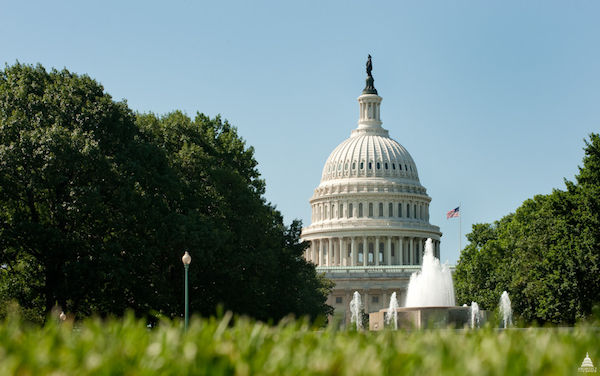SEJournal Online is the digital news magazine of the Society of Environmental Journalists. Learn more about SEJournal Online, including submission, subscription and advertising information.
 |
| U.S. Senate leaders have developed a massive aid measure, now awaiting enactment, in response to the coronavirus crisis. Above, the U.S. Capitol Dome and Senate Fountain. Photo: USCapitol/Architect of the Capitol. Click to enlarge. |
Special TipSheet: Massive COVID-19 Aid Bill Nears Passage with Key Environment, Energy Elements
By Joseph A. Davis
Democratic and GOP negotiators reportedly reached agreement in the early hours of March 25 on a $2 trillion compromise COVID-19 aid bill that may have included some key environment and energy asks.
Specific bill language had yet to be released, however, and how fast it could be enacted remained unclear.
Reports were that the bill lacked the $3 billion sought by the Trump administration to aid the oil industry by filling the Strategic Petroleum Reserve. Dems apparently won $25 billion in emergency transit funding.
The historic measure also seemed to allow aid to the ailing airline industry, but did not mention airline carbon emission reductions environmentalists had sought.
In addition, Senate leaders did not mention the clean energy tax credits Dems and environmentalists had been hoping for.
Further details were expected to develop when a Senate text arrived. House action — or even amendments — remained an unknown March 25.
Lobbyists lined up over measure
The bill announced by Senate leaders originated at the White House and was developed by Congressional Republicans. But Democrats had been vocal about what they thought it should and shouldn’t contain. Lobbyists on both sides had been lined up around the block.
From what Republicans had said, their bill might well contain large chunks of money as “relief” for industries like oil and gas (subscription required), airlines, cruise lines, hotels and small businesses. Both parties envision direct payments to Americans.
The coal industry had indicated it wants a bailout, via a demand sent to the White House (subscription required) March 19. That did not go over well with climate-focused Democrats. (An initial version (subscription required) of the GOP bill released March 20 did not appear to have oil and gas bailouts or money for the Strategic Petroleum Reserve.)
Dems, instead, have tried to put conditions on industry goodies. A large coalition of environment groups March 20 urged Republicans (subscription required) not to bail out airlines without getting big cuts in carbon emissions.
Another thing many Democrats want is a series of tax breaks (subscription required) for clean-energy industries (or renewals of expiring tax credits) — something they had failed to slip into the last big omnibus appropriations bill.
The economic hardship caused by
the pandemic has hurt the
renewables industry, too.
The economic hardship caused by the pandemic has hurt the renewables industry, too. So, included in the long line of lobbyists are also reps for the solar industry, battery storage, clean energy, wind energy, electric vehicles, etc.
Another way into the bailout tent appeared to be claims that an industry is somehow “critical” (subscription required) to the national well-being. Such claims have been lodged for health care, telecommunications and agriculture.
But the claims also come from transportation (efforts to slip the committee-passed Senate highway/transportation bill into the package so far seem to have failed), electric power, petroleum, water, wastewater, law enforcement and public works — all of which have huge environmental implications.
Find out more about the many environment and energy reporting angles to the COVID-19 outbreak in this Issue Backgrounder. Then stay tuned to SEJ.org as SEJournal Online continues to report developments and EJToday tracks daily headlines.
Joseph A. Davis is a freelance writer/editor in Washington, D.C. who has been writing about the environment since 1976. He writes SEJournal Online's TipSheet, Reporter's Toolbox and Issue Backgrounder, as well as compiling SEJ's weekday news headlines service EJToday. Davis also directs SEJ's Freedom of Information Project and writes the WatchDog column and WatchDog Alert.
* From the weekly news magazine SEJournal Online, Vol. 5, No. 12. Content from each new issue of SEJournal Online is available to the public via the SEJournal Online main page. Subscribe to the e-newsletter here. And see past issues of the SEJournal archived here.














 Advertisement
Advertisement 




